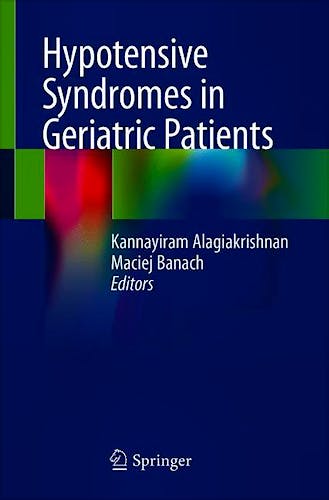

No hay productos en el carrito



Hypotensive Syndromes in Geriatric Patients
Alagiakrishnan, K. — Banach, M.
1ª Edición Febrero 2020
Inglés
Tapa blanda
203 pags
398 gr
16 x 24 x 1 cm
ISBN 9783030303310
Editorial SPRINGER
LIBRO IMPRESO
-5%
51,99 €49,39 €IVA incluido
49,99 €47,49 €IVA no incluido
Recíbelo en un plazo de
2 - 3 semanas
LIBRO ELECTRÓNICO
-5%
87,46 €83,09 €IVA incluido
84,10 €79,89 €IVA no incluido
Acceso On Line
Inmediato
1. Introduction
2. Postural/ Orthostatic Hypotension
3. Post Prandial Hypotension
4. Carotid Sinus Syndrome
5. Hypotension due to vasovagal syncope
6. Non Pharmacological management
7. Pharmacological management
8. Challenges with the diagnosis and management of these hypotensive syndromes
9. Hypotensive syndromes with chronic medical conditions/ co-morbidities:
10. Hypertension, Diabetes
11. Heart failure, Renal failure
12. Stroke, Parkinson's disease
13. Falls, Dementia
As the Baby Boomers age, concerns over healthcare systems abilities to accommodate geriatric patients grow increasingly challenging. The increased life expectancy of the population since the early 1900s had been built on the improvement of living conditions, diet, public health and advancement in medical care. With this we have seen a steady decline in the age-specific prevalence of vascular and heart diseases, stroke and even dementia.
In addition, societies worldwide struggle to develop a large enough workforce to treat aging patients, which forces geriatric patients to rely on physicians in a wide array of specialties that are often not trained for their demographic. These trends have created a tremendous need for trustworthy resources, yet with regard to hypotensive syndromes, nothing of this nature exists.
Hypotensive syndromes represent a heterogenous group of disease states. Hypotensive syndromes are characterized by low blood pressure following postural changes, meals and neck turning. These are common conditions seen in the elderly and could be due to blood pressure dysregulation. These syndromes frequently cause dizziness, syncope and falls in the elderly as well as a resultant decrease in function, and they are frequently mistaken for other conditions. This is especially true among physicians who are not trained to consider the unique needs of an aging patient.
The proposed book is designed to present a comprehensive approach to the management of hypotensive syndromes in the elderly. Currently there are no guidelines or good resource to guide about these conditions. This book will also discuss the challenges of diagnosis and management of these conditions. The text introduces the concepts to set a clear foundation before covering the syndromes as they present in other comorbidities, including diabetes, heart failure, and a wide array of serious conditions that are common in older patients. As the Baby Boomers continue to age, this text will prove a vital resource for a wide array of specialties that will be increasingly critical to meeting their needs.
Kannayiram Alagiakrishnan, MD, MPH is a professor of medicine at the University of Alberta. He specializes in both geriatric medicine and neurology and has written many articles in both areas. He has done extensive work relating common medical conditions as they relate to psychiatric and neurological comorbidities and is very interested in medical education and training for the geriatric workforce, both at the student and professional level.
© 2026 Axón Librería S.L.
2.149.0